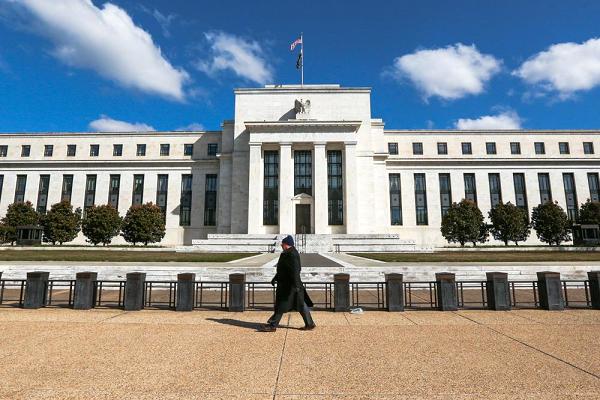
Stocks fell after the Federal Reserve hiked interest rates and indicated that two more increases are likely this year.
The Dow Jones industrial average fell 119.53 points to finish at 25,201.20 as losses in Boeing and Caterpiller shares offset gains in shares of Walt Disney Company. The S&P 500 lost 0.4 percent to close at 2,775.63 with consumer discretionary the only positive sector.
The Nasdaq composite rose to a new intraday high early in the session as media stocks rallied following a federal judge’s decision to permit AT&T’s bid for Time Warner. The tech-heavy index later dropped 0.11 percent to finish at 7,695.70 following the Fed’s decision.
The Federal Reserve hiked interest rates 25 basis points after its June meeting as widely expected, but suggested two more increases are likely this year. According to the Fed’s so-called dot plot, which tracks participant expectations for interest rates, members now expect four hikes this year, up from the three previously expected.
The notion of a more aggressive Fed raised concerns about higher borrowing costs dragging on the economy and ultimately weighed on the market. Most of the mover lower came in the final 30 minutes of trading.
The Fed changed several phrases from its prior memos, citing more optimistic economic growth and higher inflation expectations.

“Information received since the Federal Open Market Committee met in May indicates that the labor market has continued to strengthen and that economic activity has been rising at a solid rate,” the Fed statement read. “Job gains have been strong, on average, in recent months, and the unemployment rate has declined.”
Wednesday’s increase in rates moves the funds target rate to 1.75 percent to 2 percent.
“I think the market is quite rightly globing on to the view that this is a more hawkish tone,” said Eric Lascelles, chief economist at RBC Global Asset Management. “On the economic side, notwithstanding a middling start to the year, second-quarter economic growth is tracking for 4 percent. While that’s probably not sustainable … all of the economic checkpoints are reading quite strong.”

The yield on the benchmark 10-year Treasury note briefly rose above 3 percent following the central bank’s statement before retreating back to 2.977 percent. The dollar index, which pits the greenback against a basket of other currencies, initially rose above 94 before backing off to 93.57.
Media and telecommunications stocks rose on Wednesday, stemming the market’s loss, following a U.S. District Court’s decision to allow AT&T’s $85 billion bid for Time Warner.
The federal judge’s ruling did not impose conditions on the merger’s approval, clearing the way for other vertical deals. The approved deal gives the pay-TV provider ownership of cable companies such as HBO and CNN as well as film studio Warner Bros.
Shares of Twenty-First Century Fox rallied 7.7 percent Wednesday, ahead of a widely anticipated bidding war between Comcast and Disney for portions of Rupert Murdoch’s business.
Disney, which offered Fox an all-stock, $52.4 billion deal for assets including cable networks and its entertainment businesses, will likely be forced to decide whether it’s willing to top a significantly higher bid from Comcast. Disney shares finished 1.9 percent higher.
After the close, Comcast offered $65 billion in cash for the Fox assets, a 19 percent premium to Disney’s bid.
Time Warner shares rallied 1.8 percent following the ruling, while online television and film company Netflix rallied 4.4 percent after Goldman Sachs reiterated its buy rating on shares and raised its price target to the highest on Wall Street.
AT&T shares declined 6.2 percent.
Media stocks are “moving on all of the possible M&A activity and I think it’s the other potential M&A targets that are getting the attention now,” said Art Hogan, chief market strategist at B. Riley FBR. “The other concern today would be if the signal coming out of the Fed is two more hikes this year and consensus moves up on that.”
While U.S. markets have remained comparatively calm over the past two weeks, stricter monetary policy from the Fed, as well as more hawkish commentary from the European Central Bank, appeared to stress certain debt-heavy economies like those of Italy and Brazil.
The ECB will hold its policy meeting on Thursday. The institution’s chief economist, Peter Praet, said last week that the central bank will discuss how it will wind down its bond-buying program at the meeting, a move that could affect rates worldwide.
Politics is however still likely to be on investors’ minds, as markets evaluate the outcome of a meeting between President Donald Trump and North Korean leader Kim Jong Un, who both signed an agreement Tuesday that committed to “complete denuclearization” of the Korean peninsula.

